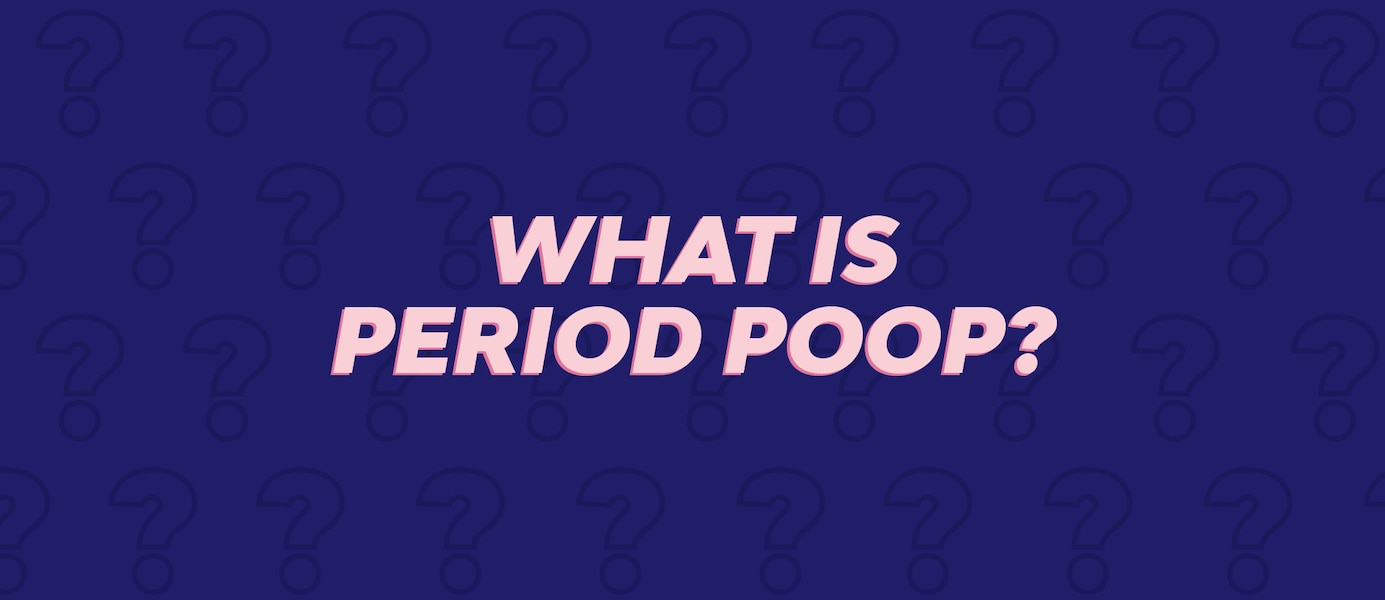What is period poop?

Have you ever noticed that there’s something different about your period poos? Well, you’re not alone.
It’s normal to notice a change in the consistency, frequency and smell of your poop when you’re menstruating, or to experience ‘period constipation’ right before your period. ‘Period diarrhoea’ is also widely experienced. Here’s why it all happens, and what you can do about it.
Why do periods affect your poop? Hormones!
Throughout your menstrual cycle, the amount of hormones in your body vary. Before your period starts, levels of progesterone are high to prepare for a possible pregnancy. Then during menstruation, your body increases levels of the compound prostaglandins, while decreasing the amount of progesterone. Prostaglandins encourage your womb muscles to contract to help break down the uterine lining[1].
So where does poop come in? Well, both progesterone and prostaglandins can affect your poop. While prostaglandins target your uterus, if your body produces more than it needs, they can enter the bloodstream and have a similar effect on other muscles, including your bowels and other digestive organs nearby – resulting in more frequent toilet trips (AKA period diarrhoea). Low levels of progesterone can also cause you to poop more often, or for you to experience loose stools.
Why do I get constipation before my period?
Another feature of the hormone progesterone is that it can have a slight constipating effect on the body. As it builds up in your body, it can slow down your digestive system. This is why you may experience some constipation the week before your period – your stomach might ache, and your poops might be infrequent, and look like small lumps, or a lumpy sausage. If you eat foods that are fatty and less fibrous thanks to your PMS food cravings, then this can also have an effect.
Certain health conditions such as Irritable Bowel Syndrome (IBS), endometriosis or even just having typically painful periods can make you more likely to be constipated, especially in the first few days of your period. As well as dealing with period constipation, it’s also normal to experience bloating and weight gain during your menstrual cycle.
Sometimes, you might feel tired and less like exercising on your period, too, which can contribute to regular bowel movements and help with period constipation.

Shop Summer Savings
With up to 40% Off Bodyform Period Pants. Get an extra 10% off 3+ pairs!
Why do period poops smell so bad?
Another side of PMS is that you may pick up some interesting food habits. Progesterone can lead you to crave unusual foods, or compulsively eat. This change in your usual diet can lead to some funky smelling period poos and of course, the dreaded period farts.
To counteract the stink, you could try to avoid overeating (especially if experiencing constipation around period, as this will cause further discomfort) and steer clear of refined sugars and processed foods. That being said, if you want to eat all the chocolate when you’re PMS-ing, then go for it! Be sure to wear comfy clothing and your favourite period pants, as well, to help unsettled bellies feel better. Our period products are reusable, and it is important to know how to wash your underwear so they are ready to be used again.
Another explanation for period poop smells is that it’s normal for menstrual blood to have an odour too, which may contribute to what you’re smelling. Other people probably can’t smell it, and it’s simply the sign of a healthy vagina, so there’s no need to be ashamed of it. Everyone’s vagina and vagina smell is different – just like how your clothes smell different to your friends because of your unique laundry powder and perfume combo! If you’re feeling a little insecure, you may feel more comfortable using a scented towel like Ultra Normal Deo Fresh which has a subtle fragrance to leave you feeling fresh.
What can you do to help period poop?
There’s no getting around it – everybody poops. There’s nothing shameful about having a few smelly poos that seem a bit weird or if you’re pooping more on your period.
If you are suffering from period-related diarrhoea (which means your poops are mushy or have a loose and watery consistency) you can take a non-steroidal anti-inflammatory drug like ibuprofen just before your period starts, to block prostaglandin production and reduce period diarrhoea[1]. It should also help with period pain by easing cramps.
To help with period constipation, try to eat more nutritious foods that are high in fibre. That could just mean a yummy fruit salad with berries, topped with nuts and seeds, or some wholegrain bread topped with your favourite spread. Drink plenty of water and move in a way that suits you [2]. If you need help loosening up your bowel movements, stool softeners can help [2]. And make friends with loose clothing, from cuddly hoodies to period pants or ultra towels that fit you just right. Tampons might not feel like the best option when straining to poop or uncomfortably constipated.
If you are experiencing severe pain when pooping on your period or continuous constipation or diarrhoea, it’s always best to talk to a doctor as certain health conditions like endometriosis or IBS can flare up during your period. It’s always best to talk to a doctor as certain health conditions like endometriosis or IBS can flare up during your period (with a symptom of pain when you poop or fart). And no one deserves to suffer in silence.
Period poop and period constipation can feel horrible but knowing that many people go through it and figuring out what works for your body can help, as can continuing to learn more about your cycle.
Read more about period pain in your bum (a condition known as proctalgia fugax) or learn what is bowel endometriosis.
Medical disclaimer
The medical information in this article is provided as an information resource only, and is not to be used or relied on for any diagnostic or treatment purposes. Please consult your doctor for guidance about a specific medical condition.
[References]
[1] https://www.nhs.uk/conditions/period-pain/
[2] https://www.medicalnewstoday.com/articles/327009#tips





